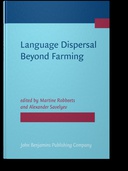Explore

Language Dispersal Beyond Farming
0 Ungluers have
Faved this Work
Login to Fave
Why do some languages wither and die, while others prosper and spread? Around the turn of the millennium a number of archaeologists such as Colin Renfrew and Peter Bellwood made the controversial claim that many of the world’s major language families owe their dispersal to the adoption of agriculture by their early speakers. In this volume, their proposal is reassessed by linguists, investigating to what extent the economic dependence on plant cultivation really impacted language spread in various parts of the world. Special attention is paid to "tricky" language families such as Eskimo-Aleut, Quechua, Aymara, Bantu, Indo-European, Transeurasian, Turkic, Japano-Koreanic, Hmong-Mien and Trans-New Guinea, that cannot unequivocally be regarded as instances of Farming/Language Dispersal, even if subsistence played a role in their expansion
Why read this book? Have your say.
You must be logged in to comment.
Rights Information
Are you the author or publisher of this work? If so, you can claim it as yours by registering as an Unglue.it rights holder.Downloads
This work has been downloaded 123 times via unglue.it ebook links.
- 123 - pdf (CC BY-NC-ND) at OAPEN Library.
Keywords
- anthropology
- Cognate
- Evolution
- Historical & comparative linguistics
- History
- Language
- Linguistics
- Rice
- thema EDItEUR::C Language and Linguistics::CF Linguistics
- thema EDItEUR::C Language and Linguistics::CF Linguistics::CFF Historical and comparative linguistics
- theoretical
Links
DOI: 10.1075/z.215Editions

